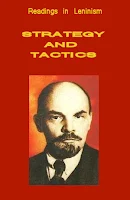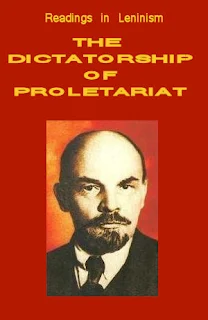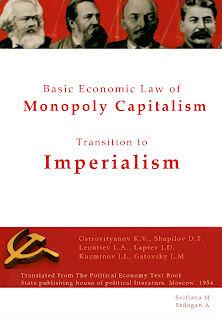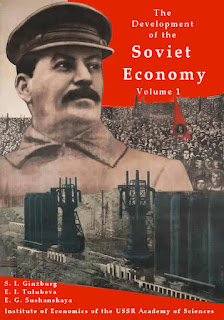Readings İn Leninism - 4 - Strategy and Tactics
STRATEGY .AND TACTICS OF THE PROLETARIAN REVOLUTION
I.FORMULATION OF THE QUESTION OF STRATEGY
AND TACTICS IN LENINISM
1. Bolshevik Strategy and Tactics as a Science of Leadership of the Class Struggle of the Proletariat
The period of · the domination of the Second International was mainly the period of the formation and instruction of the proletarian armies in an environment of more or less peace .. ful development. This was the period when parliamentarism was the outstanding form of class struggle. Questions of great class conflicts, of preparing the proletariat for revolutionary combats, of the ways and means leading to the conquest of the dictatorship of the proletariat, did not seem to be on the order of the day at that time. The task reduced itself to utiliz .. ing all paths of legal development for the formation and instruction of the armies of proletarians; for the utilization of parliamentarism in conformity with the conditions under which the proletariat was {and as it seemed then, was destined to remain) in the opposition. It need hardly be pointed out that during such a period and with such a conception of the tasks of the proletariat, there could be neither complete strategy nor any elaborated tactics. There were fragmentary and de-tached ideas about tactics and strategy, but no tactics or strategy as such.
The mortal sin of the Second International was not that it adopted the tactic of utilizing the parliamentary forms of struggle, but that it overestimated the importance of these forms, that it considered them to be virtually the only forms; and when the period of open revolutionary combats arrived and the question of extra-parliamentary forms of struggle came to the fore, the parties of the Second International turned their backs on these new tasks and refused to shoulder them.
Only in the subsequent period, the period of direct action by the proletariat, in the period of proletarian revolution, wb.en the question of the overthrow of the bourgeoisie be-came a question of immediate practice, when the question of the reserves of the proletariat (strategy) became one of the most burning questions, when all forms of struggle and of organization, parliamentary and extra-parliamentary (tactics), assumed definite shape-only in this period could a complete strategy and detailed tactics for the struggle of the proletariat be elaborated. It was precisely in that period that Lenin dragged into the light of day the brilliant ideas of Marx and Engels on tactics and strategy, that had been immured by the opportunists of the Second International. But Lenin did not rest content with restoring certain tactical theses of Marx and Engels. He developed them further and supplemented them with new ideas and new theses, correlating them all in a system of rules and guiding principles for the leadership of the class struggle of the proletariat. Lenin's pamphlets, such as What Is to Be Done?; Two Tactics; Imperialism,; State and Revolution; The Proletarian Revolution and Renegade Kautsky; "Left-Wing" Communism, etc., will doubtless be treasured as priceless contributions to the general store of Marxism and to its revolutionary arsenal. The strategy and tactics of Leninism constitute the science of leadership of the revolutionary struggle of the proletariat.
Joseph Stalin, Lenin-ism, Vol. I, pp. 72-73.
2. First Principles of Strategy and Tactics of the Proletariat and Examples from Marx and Engels
Having discovered as early · as 1844-45 * (*Lenin refers here to Marx's and Engels' works: The Holy Family, German Ideology and Marx's Theses on Feuerbach.-Ed. ) that one of the chief defects of the earlier materialism was its failure to understand the conditions or recognize the importance of prac-tical revolutionary activity, Marx, during all his life, along with his theoretical work, gave unremitting attention to the tactical problems of the class struggle of the proletariat. An immense amount of material bearing upon this is contained in all the works of Marx; and particularly in the four volumes of his correspondence with Engels (Briefwechsel), published in 1913. This material is still far from having been collected, systematized, studied, and elaborated. This is why we shall have to confine ourselves to the most general and brief re-marks, emphasizing the point that Marx justly considered materialism without this side to be incomplete, one-sided, and devoid of vitality. The fundamental task of proletarian tactics was defined by Marx in strict conformity with the general principles of his materialist-dialectical outlook. Nothing but an objective account of the totality of all the mutual rela-tionships of all the classes of a given society without excep-tion, and consequently an account of the objective stage of development of this society as well as an account of the mutual relationship between it and other societies, can serve as the basis for the correct tactics of the advanced class. All classes and all countries are at the same time looked upon not stati-cally, but dynamically; i.e., not as motionless, but as in mo-tion (the laws of their motion being determined by the eco-nomic conditions of existence of each class). The motion, in its turn, is looked upon not only from the point of view of the past, but also from the point of view of the future; and, moreover, not only in accordance with the vulgar conception of the "evolutionists," who see only slow changes-but dia-lectically: "In developments of such magnitude, twenty years are more than a day-so later on days may come in which twenty years are embodied," wrote Marx to Engels (Brief-wechsel, Vol. III, p. 127).
At each stage of development, at each moment, proletarian tactics must take account of these objectively unavoidable dia-lectics of human history, utilizing, on the one hand, the periods of political stagnation, or periods when things are moving at a snail's pace along the road of so-called "peaceful" develop-ment, to increase the class consciousness, strength, and fighting capacity of the advanced class; on the other hand, conducting this work in the direction of the "final aim" of the movement of this class, cultivating in it the faculty for practically carry-ing out great tasks in great days in which "twenty years are embodied." Two of Marx's arguments are of especial im-portance in this connection: one of these is in The Poverty of Philosophy, and relates to the industrial struggle and to the industrial organizations of the proletariat; the other is in The Communist Manifesto, and relates to the proletariat's politi-cal tasks. The former runs as follows:
Large-scale industry concentrates in one place a crowd of people unknown to one another. Competition divides their interests. But the maintenance of wages, this common interest which they have against their boss, unites them in a common thought of resistance-combination . . . combinations, at first isolated, constitute themselves into groups, as the capitalists in their turn unite in the idea of repression, and in face of always-united capital, the maintenance of the association becomes more necessary to them than that of wages .... In this struggle-a veritable civil war-are united and developed all the elements necessary for a coining battle. Once it has reached this point, association takes on a political character.*
Here we have the program and the tactics of the economic struggle and the trade union movement for several decades to come, for the whole· long period in which the workers are pre-paring for "a future battle." We must place side by side with this a number of references by Marx and Engels to the ex-ample of the British labor movement; how, in consequence of industrial "prosperity," attempts are made "to buy the workers" (Briefwechsel; Vol. I, p. 136), to distract them from the struggle; how, generally speaking, this prosperity "de-moralizes the workers" (Vol. II, p. 218); how the British proletariat is becoming "bourgeoisified"; how "the ultimate aim of this most bourgeois of all nations seems to be to estab-lish a bourgeois aristocracy and a bourgeois proletariat side by side with the bourgeoisie" (Vol II, p. 290); how the "revo-lutionary energy" of the British proletariat oozes away (Vol. III, p. 124) ; how it will be necessary to wait for a considerable time before the British workers can rid themselves of their apparent bourgeois corruption." (Vol. III, p. 127) ; how the British movement "lacks the mettle of the Chartists" (1866: Vol. III, p. 305); how the British workers' leaders are developing into something between "a radical bourgeois and a worker" (Vol. IV, p. 209, on Holyoake); how, owing to British monopoly, and as long as that monopoly lasts, "the British workingman will not budge" (Vol. IV, p. 433). The tactics of the economic struggle, in connection with the general course (and the outcome) of the labor movement, are here consid-ered from a remarkably broad, many-sided, dialectical, and genuinely revolutionary outlook.
On the tactics of the political struggle, the Communist Manifesto advanced this fundamental Marxian thesis:
The Communists fight for the attainment of the immediate aims, for the enforcement of the momentary interests of the working class; but in the movement of the present, they also represent and take care of the future of that movement.*
That was why, in 1848, Marx supported the Polish party of the "agrarian revolution"-"the party which initiated the Cracow insurrection in the year 1846." In Germany during 1848 and 1849 he supported the radical revolutionary democ-racy, and subsequently never retracted what he had then said about tactics. He looked upon the German bourgeoisie as "inclined from the very beginning to betray the people" ( only an alliance with the peasantry would have enabled the bourgeoisie completely to fulfill its tasks) "and to compromise with the crowned representatives of the old order of society." Here is Marx's summary account of the class position of the German bourgeoisie at the time of the bourgeois-democratic revolution-an analysis which, among other things, is an ex-ample of that materialism, which considers society in motion, and not only that part of the motion which is directed back-wards!
* Communist Manifesto, p. 43, London and New York, 1933.-Ed.
Lacking faith in themselves, lacking faith in the people; grumbling at those above, and trembling in face of those below ... dreading a world-wide storm ... nowhere with energy, everywhere with plagiar-ism' ... without initiative ... -a miserable old man, doomed to guide in his own senile interests the first youthful impulses of a young and vigorous people .... (Neue Rheinische Zeitung, 1848; see Literarischer Nachlass, Vol. III, p. 213.)
About twenty years afterwards, writing to Engels (Brief-wechsel, Vol. III, p. 224), Marx said that the cause of the failure of the Revolution of 1848 was that the bourgeoisie had preferred peace with slavery to the mere prospect of having to fight for freedom. When the revolutionary period of 1848-49 was over, Marx was strongly opposed to any playing at revo-lution (Schapper and Willich, and the fight with them), in-sisting on the need for knowing -how to work under the new conditions, when quasi-"peacefullyn new revolutions were in the making. The spirit in which Marx wanted the work to be carried. on is plainly shown by his estimate of the situation in Germany during the period of blackest reaction in 1856: "The whole thing in Germany will depend on the possibility of backing the proletarian revolution by some second edition of the Peasant War." (Briefwechsel, Vol. II, p. 108).
While the bourgeois-democratic revolution in Germany was in progress, Marx directed his whole attention, in the matter of tactics of the socialist proletariat, to developing the demo-cratic energy of the peasantry. He held that Lassalle's action was "objectively ... a betrayal of the whole workers' move-ment to the Prussians" (Briefwechsel, Vol. III, p. 210), among other things, because he "favored the Junkers and Prussian Nationalism." On February 5, 1865, exchanging views with Marx regarding a forthcoming joint declaration of theirs in the press, Engels wrote (Briefwechsel, Vol. III, p. 217) :
... In a predominantly agricultural country ... it is dastardly to make an exclusive attack on the bourgeoisie in the name of the industrial proletariat, but never to devote a word to the patriarchal exploitation of the rural proletariat under the lash of the great feudal aristocracy .
During the period from 1864 to 1870, when the epoch of the bourgeois-democratic revolution in Germany, that epoch of the fight of the exploiting classes of Prussia and Austria for completing the revolution from above, in one way or another, was coming to an end, Marx not only condemned Lassalle for coquetting with Bismarck, but also corrected Wilhelm Liebknecht, who had lapsed into "Austrophilism" and defended particularism. Marx insisted upon revolutionary tactics that would fight against both Bismarck and "Austro-philism" with equal ruthlessness, tactics that would not only suit the "conqueror," the Prussian Junker, but would forth-with renew the struggle with him upon the very basis created by the Prussian military successes (Briefwechsel, Vol. III, pp. 134, 136, 147, 179, 204, 210, 215, 418, 437, 440, 441). In the famous Address of the International W orkingmen's Associa-tion, dated September 9, 1870, Marx warned the French prole-tariat against an untimely uprising; but when, in 1871, the uprising actually took place, Marx hailed with the utmost en-thusiasm the revolutionary initiative of the masses, who were "storming heaven."* In this situation, as in so many others, the defeat of a revolutionary onslaught was, from the Marxian standpoint of dialectical materialism, from the point of view of the general course and the outcome of the proletarian struggle, a lesser evil than would have been a retreat from a. position hitherto occupied, a surrender without battle, as such a surrender would have demoralized the proletariat and under-mined its readiness for struggle. Fully recognizing the im-portance of using legal means of struggle during periods of political stagnation, and when bourgeois legality prevails, Marx, in 1877 and 1878, when the Exceptional Law against the Socialists had been passed in Germany, strongly con-demned the "revolutionary phrase-making" of Most; but he attacked no less, and perhaps even more sharply, the oppor-tunism that, for a time, prevailed in the official Social-Demo-cratic Party, which, on the spur of the moment, failed to manifest resolution, firmness, revolutionary spirit, a readiness to resort to illegal struggle in reply to the Exceptional Law. (Briefwechsel, Vol. IV, pp. 397, 404, 418, 422, and 424; also letters to Sorge.)
V. I. Lenin, Marx-Engels-Marxism, pp. 29-33.
3. Leadership in a Situation and Consideration for Its Peculiarities-the Main Characteristic of Leninist Strategy and Tactics
... while the working class movement is everywhere passing through what is practically a similar preparatory school for victory over the bourgeoisie, it is in each country achieving this development in its own way. The big, advanced capitalist countries are marching along this road much more rapidly than did Bolshevism, which history granted a period of fifteen years to prepare itself for victory as an organized political trend. The Third International has already scored a decisive victory in the short space of one year; it has defeated the yellow, social-chauvinist Second International, which only a few months ago was incomparably stronger than the Third International, and which seemed to be firm and strong, enjoying the all-round support direct and indirect, material (ministerial posts, passports, the press) and ideological-of the world bourgeoisie.
The main thing now is that the Communists of every country should quite consciously take into account the fundamental tasks of the struggle against opportunism and "Left" doctrinairism as well as the concrete peculiar features which this struggle assumes and inevitably must assume in each separate country in accordance with the peculiar features of its economics, politics, culture, national composition (Ire-land, etc.), its colonies, religious divisions, etc. Everywhere we observe widening and growing dissatisfaction with the Second International because of its opportunism, its inability or incapability, to create a really centralized, really leading center which would be capable of guiding the international tactics of the revolutionary proletariat in its struggle for the world Soviet republic. We must clearly realize that such a leading center cannot in any circumstances be built up on stereotyped, mechanically equalized, identical tactical rules of the struggle. As long as national and state differences exist among peoples and countries--and these differences will continue to exist for a very long time, even after the dictator-ship of the proletariat has been established on a world scale -the unity of international tactics of the communist work-ing class movement of all countries demands, not the elimination of variety, not the abolition of national differences (this is a foolish dream at the present moment), but such an application of the fundamental principles of Communism (Soviet power and the dictatorship of the proletariat) as will correctly modify these principles in certain particulars, will properly adapt, apply them to the nat onal and national-state differences. To investigate, study, seek out, divine, grasp that which is specifically national in the concrete manner in which each country approaches the fulfillment of the single international task, the victory over opportunism and "Left" doctrinairism in the working class movement, the overthrow of the bourgeoisie, the establishment of a Soviet republic and a proletarian dictatorship-this is the main task of the historical period through which all the advanced (and not only the advanced) countries are now passing. The main thing-not everything, by a long way-but the main thing has already been achieved in that the vanguard of the working class has been won over, in that it has gone over to the side of the Soviet power against parliamentarism, to the side of the dictatorship of the proletariat against bourgeois democ-racy. Now all efforts, all attention, must be concentrated on the next step-which means, and from a certain standpoint really is, less fundamental, but which in fact is much closer to the practical carrying out of the task-namely, on seeking out the forms of transition or approach to the proletarian revolution.
... History generally, and the history of revolutions in particular, is always richer in content, more varied, more many-sided, more lively and "subtle" than the best parties · and the most class conscious vanguards of the most advanced class imagine. This is understandable, because the best van-guards express the class consciousness, the will, the passion, the phantasy of tens of thousands, while the revolution is made, at the moment of its climax and the exertion of all human capabilities,, by the class consciousness, the will, the passion, and the phantasy of tens of millions who are urged on by the very acutest class struggle. From this follow two very important practical conclusions: first, that the revo-lutionary class, in order to fulfill its task, must be able to master all forms or sides of social activity without excep-. tion (and complete after the capture of political . power ' some-times at great risk and amidst very great dangers, what it did not complete before the capture of power); second, that the revolutionary class must be ready to pass from one form to another in the quickest and most unexpected manner.
V. I. Lenin, "Left-Wing" Communi-sm: .An Infantile Di-sorder, pp. 71- 72; 75.
4. International Significance of Bolshevik Strategy
Continue
Continue





























.jpg)




















